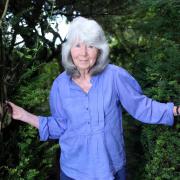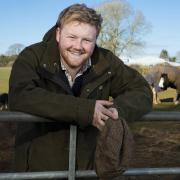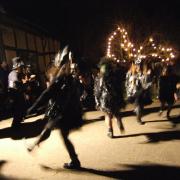Poet, novelist and biographer Sir Andrew Motion described his appointment as president of CPRE – the Campaign to Protect Rural England – as one of the great honours of his life. Katie Jarvis asked him about poetry, planning, and his passion for the pastoral

• Sir Andrew, this year is the centenary of the start of the First World War, of course; but what did British soldiers die to protect? Was it the greenness of the land or was it the right of every man, woman and child to have their home? And isn’t that the crux of our problem today?
We could talk about this all day, and it’s a very interesting question. At the end of Wilfred Owen’s poem, The Send-off, he wonders how many men will come back:
A few, a few, too few for drums and yells,
May creep back, silent, to still village wells
Up half-known roads.
What he seems to be recognising is that the landscape they’re going to come back to – the village-scape in this case - won’t be quite as it was when they left. And not just because lots of people have been killed. Similarly, Edward Thomas, at the end of As the Team’s Head-brass – about watching a ploughman – sees the tractor coming:
The horses started and for the last time
I watched the clods crumble and topple over
After the ploughshare and the stumbling team.
So they were completely prepared to accept that the world changes in much the same way that the CPRE accepts progress will happen. And people need houses… But be incredibly careful how you do it! We have a Government that is apparently so hell-bent on rebuilding the economy, which undoubtedly does need to happen, that it’s loosened all kinds of ties which ought to be strictly maintained. As an unintended consequence (I like to think it’s an unintended consequence), we’re faced with a very serious problem of not enough houses, being built on land that is precious. Meanwhile brownfield sites are being neglected. There are a million-and-a-half brownfield sites available, of a size and a kind completely suited to the sorts of housing we need: small houses for kids who want to get on the property ladder; smaller houses for older people who are downsizing. What we don’t need is a few ranch-style homes sprawling over the greenbelt - because that’s where developers make their profits.
• In Stroud, the Slad Valley has been under threat from developers. Does a famous association add value or should we treat all green fields in the same way?
It helps to articulate the value of the land, I think. After all, we can’t go to the Lake District without thinking about Wordsworth and Coleridge. We can’t go to Crickley without thinking about Ivor Gurney; or Shakespeare in Stratford; or Tennyson in parts of Lincolnshire. What these very site-specific writers do is to give a voice to the spirit of the place; it doesn’t initiate, necessarily, its value for the people who either already live there or who visit. But it helps them to articulate their feelings about it in ways that are very valuable. So people stomping around on Laurie’s walk [Gloucestershire Wildlife Trust’s new Slad Valley walk] will see his poems in context and it will make them better readers of him, as well as better lovers of the countryside.
• You talk about brownfield sites as ideal building ground. Yet wildlife trusts will tell you they can be better wildlife havens than denuded green fields. It’s the same with wind farms: arguments for and against can be equally persuasive... So whom do you believe? It’s easy to see why people simply end up saying, ‘OK; just don’t build it near me!’
I think that’s a very good way of putting it! Having said that, you have to take a position that is informed by real, hard knowledge; by proper aesthetic sense; by a feeling for the heritage; by a wish to reconcile the heritage with the inevitable need for progress. And then, having described your position to yourself, stand by it. I perfectly understand that, in a lot of urban contexts, brownfield sites do have a surprising amount of valuable mini-ecology. But if you house people there instead of spoiling greenfield sites, there’s no earthly reason why you shouldn’t then go and do something about beefing up things on the greenfield sites, where you might expect [flora and fauna] to have a more prolific existence. It’s really not an either/or.
• Are planning laws safe in government hands?
The present situation, which is not anything short of a crisis, is full of ironies and paradoxes; and one of those ironies is that the Government, with the NPPF [National Planning Policy Framework], has said it wants to put more power in the hands of local people. But because a lot of local authorities haven’t got their planning schemes in place, they’ve been caught on the hop. As they hop around, developers are free to move in and do what they want. And that is not what the councils themselves – if they’ve got their heads screwed on – might wish to propose as a sensible solution; and emphatically not what the local people themselves want. So it’s ended up the worst of all worlds. It means that the wrong kinds of houses are being built in the wrong places, and not enough of them; and the local people don’t have a say. Loss, loss, loss, loss, loss, whichever way you look at it.
• So what can we do to right that?
Think who you’re going to vote for in 2015! Listen to what the various parties are saying about planning in 2015.
• Last time we spoke, we talked about children and poetry; whether schools were doing enough to promote not just poetry but a love of poetry. I’d ask the same about the countryside. Do we miss a trick by expecting people to get to 18 and suddenly understand the planning system? Or to have developed a spontaneous understanding of rural life?
Good point. One of the things I’m most keen to encourage the CPRE to do is to develop a set of schemes by which young people are involved in the organisation so that they know what there is to like about the country. I live in a street in Kentish Town in North London, which is full of kids who are absolutely bored out of their skulls. I haven’t asked them but I wouldn’t be surprised if not one of them has ever been to the countryside - so how on earth are they to know what there is to enjoy there? And of course, consequentially, how are they to know what there is to value and protect there? In schools, we ought to do what we can to educate people both in the pleasures and the need for protection. And organisations like our own must work very hard to hook in these younger people.
--------------------------
For more information about the Gloucestershire branch of CPRE, visit www.cpreglos.org.uk



























